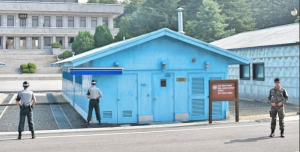One of the North Korean soldiers who defected to the South in 2017 was found to have antibodies in his bloodstream, a sign Pyongyang possesses anthrax, the acute disease caused by bacteria.
South Korean authorities did not identify the soldier, who was either exposed to or vaccinated for anthrax, but did confirm he had developed immunity to the deadly disease before he defected, local news network Channel A reported Tuesday.
“Anthrax antibodies have been found in the North Korean soldier who defected this year,” a South Korean intelligence official told the network on the condition of anonymity.
The discovery of the antibodies is causing concern in Seoul.
The disease can kill at least 80 percent of those who are exposed to the bacterium in 24 hours, unless antibiotics are taken or vaccination is available.
But South Korea’s military has yet to secure an anthrax vaccine.
Defense Ministry spokeswoman Choi Hyun-soo has said an anthrax “vaccine is expected to be developed by the end of 2019,” but not sooner, for the South Korean military.
North Korea has been suspected of developing biological weapons after the regime publicized the works of the Pyongyang Biological Technology Research Institute in 2015, run by the Korean People’s Army Unit 810.
Pyongyang claimed the facility specializes in pesticide research but analysts have said dual-use equipment on the site suggests biological weapons are being manufactured in North Korea.
The news of possible North Korea anthrax development comes at a time when South Korean newsmagazine Sisa Journal is reporting the U.S. military in the South has continued to test live bacteria at local bases.
The Joint United States Forces Korea Portal and Integrated Threat Recognition, or JUPITR, is budgeted to receive about $9 million, according to the report.
The program, aimed to shape biological detection capabilities, is ongoing, according to Sisa.
Concerns spiked in South Korea after Seoul’s defense ministry confirmed the U.S. military in South Korea imported samples of anthrax 15 times since 2009, and a shipment in 2015 exposed as many as 22 people.
Source: upi.com
Ask me anything
Explore related questions





